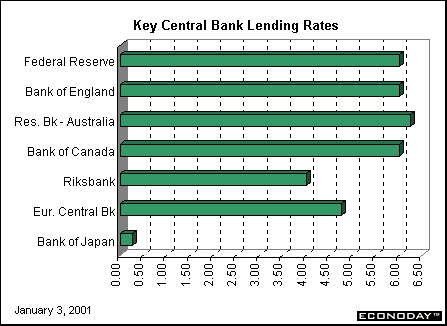Monday, January 8, 2001

Something old, something new
If U.S. markets are unsure what the Federal Reserve's surprise interest rate reduction means, foreign markets are mystified by the 50 basis point cut in the Fed funds rate. How does one interpret such an out of character move? - inter-meeting moves are unusual. Are things really that bad in the United States? What happened to the teflon coated new economy that was untouchable even by normal business cycles? One thing is sure, this Fed doesn't want a recession on its watch and will do everything it can to stem the softening in the U.S. economy.

The impact of the U.S. slowdown overseas remains to be seen. European and British analysts seem to be downplaying the impact it will have on their economies. While the EMU and Britain are slowing somewhat, analysts there feel they are immune to the U.S. type economic slowdown currently taking place here.
Not unexpectedly, the euro is rising against the U.S. dollar. This will have an impact on profits both here and abroad. The euro's increased value will help repatriate profits of U.S. companies while hurting those of European firms.
As expected, the European Central Bank did not change interest rates at their meeting on Thursday although inflation continues to be higher than the mandated 2 percent. Higher inflation has been ascribed to be primarily an energy event, with underlying inflation still less than two percent. Money supply growth, the second pillar of ECB policy making, has been gradually declining. (See indicator scoreboard below.) The benchmark interest rate gap between the U.S. and euro region, which has narrowed by 150 basis points since June thanks to ECB rate increases, is now 125 basis points - raising the appeal of euro deposits compared with those in dollars.
Greece officially has forsaken the drachma and joined the European Monetary Union on January first. It is now EMU 12.

